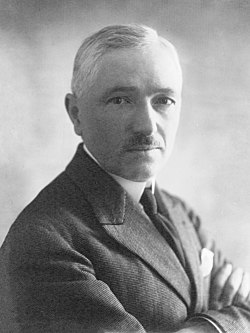Jules Rimet
| Jules Rimet | |
|---|---|

Jules Rimet, photographed in 1920
|
|
| 3rd President of FIFA | |
|
In office 1 March 1921 – 21 June 1954 |
|
| Preceded by | Daniel Burley Woolfall |
| Succeeded by | Rodolphe William Seeldrayers |
| President of FFF | |
|
In office 1919–1942 |
|
| Succeeded by | Henri Jevain |
| Personal details | |
| Born |
14 October 1873 Theuley, Franche-Comté, France |
| Died | 16 October 1956 (aged 83) Suresnes, Île-de-France, France |
| Nationality | French |
| Profession | Football administrator |
Jules Rimet (French pronunciation: [ʒyl ʁimɛ]; 14 October 1873 – 16 October 1956) was a French football administrator who was the 3rd President of FIFA, serving from 1921 to 1954. He is FIFA's longest-serving president, in office for 33 years. He also served as the president of the French Football Federation from 1919 to 1942.
On Rimet's initiative, the first FIFA World Cup was held in 1930. The Jules Rimet Trophy was named in his honour. He also founded the French football club Red Star Saint-Ouen.
Jules Rimet was born in 1873 in eastern France. His father was a grocer, and the family moved to Paris in 1884 when Jules was eleven years old. He became a lawyer, and in 1897 he started a sports club called Red Star which, due to Rimet's ideals, did not discriminate against its members on the basis of class. One of the sports played at the club was football, which was becoming popular.
Rimet was involved in the founding of the Fédération Internationale de Football Association (International Federation of Association Football, commonly abbreviated to FIFA) in 1904, and, while the fledgling organisation had plans for a global professional tournament, it instead was involved in running an amateur tournament as part of the 1908 Summer Olympics.
The First World War put Rimet's and FIFA's plans on hold. Rimet served in the French Army as an officer and was decorated with a Croix de Guerre.
Following the war in 1919, he became President of the French Football Federation, and then President of FIFA on 1 March 1921. He would hold the post until 1954 becoming the longest reigning President to date, taking the membership of the organisation from twelve up to 85 nations, despite losing the membership of the English, Welsh and Scottish Football Associations during the early years. After taking up the post he moved once again to start a global tournament, but was opposed by the amateur football associations and Pierre de Coubertin, founder of the International Olympic Committee.
...
Wikipedia
